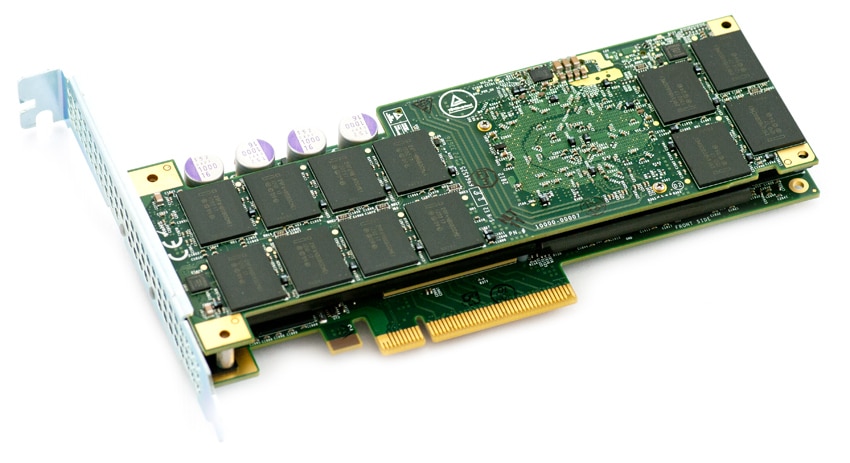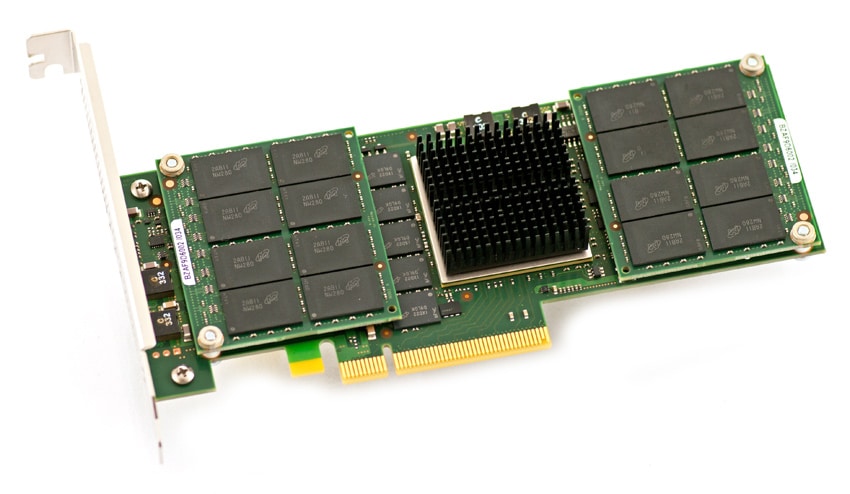EMC has consolidated their array of flash offerings under new branding, Xtrem. The EMC Xtrem family incorporates three core offerings. XtremSF (server flash) includes PCIe application accelerators, XtremSW (software) includes caching solutions, formerly referred to as VFcache, and XtremIO, the all flash array formally referred to as Project X and part of the XtremIO acquisition. As part of today’s announcement, EMC has revealed that they have expanded their line of XtremSF cards, adding three MLC-based offerings to the mix. Also, their XtemIO flash array is now entering directed availability with general availability expected later this year.
XtremSF Expansion
While EMC doesn’t make and manufacture their own PCIe flash cards, they’ve been selling SLC-based solutions from Micron and LSI for some time, largely in conjunction with XtremSF server-side caching software. Those cards are somewhat limited though in that they were only available in 350GB and 700GB capacities and only in SLC NAND configurations. EMC has now certified new application accelerator products, the FlashMax II line from Virident and the unannounced and unreleased "Micron P420." Both products come with MLC NAND and allow EMC to expand their caching and server storage offerings by adding new 550GB, 700GB, 1.4TB, and 2.2TB capacities. Virident will supply the 550GB and 2.2TB cards, while Micron will supply the 700GB and 1.4TB when they’re generally available later this year. EMC already sells a 350GB and 700GB SLC product from Micron in the XtremSF family. LSI which was part of the VFCache line initially, looks to have been dropped in this refresh.
Virident FlashMax II 2.2TB MLC
As part of this expansion in qualified flash cards, EMC has notes on performance including:
- XtremSF dramatically accelerates application performance, achieving a record 1.13 million IOPS and delivering 2X higher throughput.
- XtremSF delivers new levels of efficiency, reducing CPU utilization by up-to 50%, and providing 58% better total cost of ownership (TCO) than other offerings.
While there’s little doubt that EMC has selected very good PCIe storage solutions to be a part of the XtremSF solutions, one must be hesitant when accepting manufacturer claims without further investigation. EMC’s claims hinge almost entirely on form factor; all of the cards in the XtremSF portfolio are half-height, half-length, making them largely universal with mainstream servers. EMC draws comparison to Fusion-io’s ioDrive2 MLC in the "2X higher throughput" claim, but they’re comparing to their own Virident FlashMax II 2.2TB offering, which leverages dual controllers compared to the single controller in the Fusion-io product. When we probed as to the validity of the comparison, the logic was based only on form factor, comparing the leading HHHL cards against one another. The Fusion-io ioDrive2 Duo MLC, which uses two controllers, is arguably more comparable to the Virident but is a full-height, half-length card. EMC contends that HHHL cards are easier to install, service and support and provide better thermals and airflow for CPU and memory, so they disregarded full-height cards as not comparable.
The other Fusion-io attack comes around CPU utilization where EMC XtremSF cards are capable of "reducing CPU utilization by up-to 50%." While this is technically true, the comparables used are the Micron P420, which has not yet made it to final production, and the Fusion-io ioDrive2 MLC. Of course these 50% gains are because Fusion-io offloads to CPU where the Micron uses an ASIC for on-card flash management. Had EMC compared the new Virident cards to the Fusion-io product, the difference would be less pronounced, if evident at all.
None of these marketing/promotional tactics are inherently wrong; the information presented is accurate. The nuance in the comparables selected and the subsequent messaging requires context however, which we’ve provided here. At the end of the day though, EMC has selected very good cards for their XtremSF lineup. The new capacities and configurations provide customers with a solution for almost every sort of application acceleration pain, be it in-server storage or a combination with XtremSW for cache acceleration.
XtremIO Directed Availability
EMC’s XtremIO takes one more step toward general availability today with what EMC calls "directed availability." DA is more broad than beta testing, but it greatly expands the number of XtremIO systems in customer hands. XtremIO is highlighted by its use of commodity hardware and its compatibility with any storage behind it, acting as a flash acceleration tier suitable for high-demand applications like databases and VDI deployments.
Gen1 XtremIO (Project X) Hardware
XtremIO systems are sold in X-Bricks, which offer 7TB of MLC-based storage. Each X-Brick tops 150,000 functional 4K mixed read/write IOPS (read: real world working IOPS) and a cluster of 8 X-Bricks can scale to over 1.2 million functional IOPS. The systems also feature enterprise features like: real-time inline deduplication, full performance snapshots and clones, thin provisioning, full VAAI support, FC and iSCSI host ports, flash-specific data protection, simple provisioning, and stable performance under load.
XtremSW Cache
XtremSW is EMC’s caching software and hardware combination, which was launched as VFCache. Initially the caching software only worked with a thin selection of SLC-based flash cards. With today’s announcement expanding the XtremSF line with MLC cards, XtremSW now grows to include those options as well. EMC intends to continue to grow the caching application capabilities and options, creating a more comprehensive XtremSW Suite. With a release later this year, XtremSW will grow to include; pooling, cache coherency, deeper EMC storage array integration, and enhancements for VMware environments.
Availability
EMC XtremSF 550GB and 2.2TB MLC capacities are generally available now, and the 700GB and 1.4TB capacities will become available later this year. XtremSW caching solutions are generally available now too. XtremIO is in directed availability now with general availability later this year.






 Amazon
Amazon